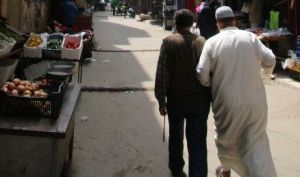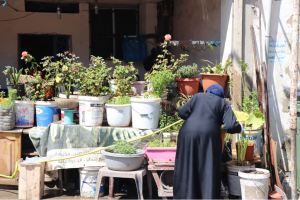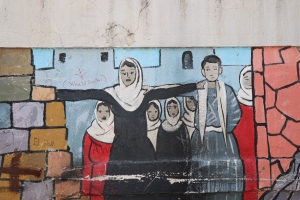In contrast to the ‘hyper-visibility’ of humanitarian aid designed and delivered by countries of the global North, humanitarian aid provided by countries of the Global South remains mostly unseen. In this interview, Dr Estella Carpi and Dr Mirian Alves de Souza, discuss how countries in the Global South, with a particular focus on Brazil, have been providing alternative ways of responding to forced displacement and how different geopolitical, historical and cultural influences, as well as national politics and legal frameworks, can influence the aid provided to refugees from Syria. The conversation goes on to discuss how humanitarian aid and refugee resettlement in Brazil is also delivered by civil society initiatives, including faith-based humanitarianism, and it is these initiatives that can often bridge the gap in national provision that is experienced by Syrian refugees in Brazil. These are themes we have been exploring in the Southern Responses to Displacement project, and in particular in our Introductory Mini Blog Series found here.
If you find this piece of interest, please visit the recommended reading list at the end of this piece.
The Role of Brazil in the North and South: Discussing Refugee Reception with Dr Mirian Alves de Souza
By Estella Carpi and Mirian Alves De Souza
During emergency crisis, foreign countries either choose to provide humanitarian assistance to displaced persons in the crisis-affected country, or assist refugees in the neighbouring countries, or allow the resettlement of refugees within their own national borders. The models of assistance and recovery designed in the ‘Global North’ tend to lead the official humanitarian discourse being hyper-visible on the international stage. By contrast, refugee resettlement in the countries of the ‘Global South’, over the last decades, has received significantly less attention in the international media and in the academic literature. The ‘Southern Responses to Displacement from Syria: Views from Lebanon, Jordan and Turkey’ project, funded by the European Research Council (agreement no. 715582),[1] aims to explore non-hegemonic responses to displacement, which often overlap with what have been defined as ‘Southern-led’ efforts in areas of intervention.
In this conversation with Dr Mirian Alves De Souza, a social and political anthropologist of the Universidade Federal Fluminense (UFF) with expertise in Middle Eastern migrations in Brazil and in Roma people, and Dr Estella Carpi, from the Southern Responses to Displacement team, they discuss how countries in the Global South have been providing alternative ways of responding to forced displacement. One such country is Brazil, whose role in the response to displacement from Syria can inform us about the nature and implications of ‘Southern-led’ responses to crisis. The involvement of these states, which is usually about refugee resettlement or, like Brazil, an eligibility scheme, tends to be less visible in the crisis-affected areas. However, the lack of clear policies and concrete support mechanisms weakens the eligibility system, giving rise to many criticisms.
Estella Carpi: In 2011, erstwhile Brazilian President Dilma Rousseff stated: “We are ready to cooperate with our sister countries in the developing world”. At that time, global solidarity speeches were more frequent in Brazil, and they were reinforced through the use of the “South” label as a specific identity marker. This enabled states that are generally associated with the Global South, like Brazil, to identify with a shared “Southern” community, based on certain common attributes. In this context, the Brazilian government’s invocation of the “South” label demonstrated that the label itself can hold important political capital. Reflecting the ambiguous position of the Brazil-Russia-India-China-South Africa (BRICS)[2] countries in the global political arena, characterized by emerging economies and rising political influence, Brazil has alternatively located itself as closer to the Global North or the Global South. What is your perspective on this, Mirian?
Mirian Alves de Souza: The idea of South should be seen in a critical way. I think it is important to identify differences in terms of law, as there are often gaps between the law and how things are on the ground. As an anthropologist, I examine human experiences, and those can’t really be captured by any binary approach. And if “South” wants to refer to people-led initiatives, in Brazil it is more meaningful to look outside of institutional humanitarian work. I think we should rather focus on civil society and informal ways of organizing aid to really understand the Brazil case. Thailand and Ecuador are open to Syria, as Brazil is, and they are all rarely mentioned as destination countries.
However, Brazil is not viewed as a good option for refugees from Syria. The people I met did mention that at the beginning they wondered why they should have picked Brazil for resettlement. You know, normally representations of Brazil revolve around the Carnival and football, no one would think of refugee resettlement. During the Partido dos Trabalhadores mandate, the government developed a humanitarian vision. This mandate includes the mandate of President Lula and Dilma Rousseff. In the public sphere, both these presidents largely drew on humanitarian language in political speeches.
Yet, a substantial difference remains in Brazil when you compare this national legal scheme to countries like Canada where proper resettlement is possible for Syrian refugees. Palestinians and other refugee groups were resettled in Brazil. In the case of resettlement (in Portuguese reassentamento), refugees are not supposed to do anything: you do not need to make ends meet as soon as you arrive, as you become part of a scheme that supposedly works towards your self-reliance and integration into the host society. These refugee groups such as Palestinians did enjoy more rights than Syrians, as they were able to become asylum seekers.
Syrians in Brazil can instead only access an eligibility system (eligibilidade). That means that the government does not have obligations towards these refugees. In practical terms, once they arrive, Syrians are by themselves, no one is accountable. Yet, Brazil wanted to emerge as a global player during Lula’s and Dilma’s mandates by performing humanitarianism. But lots of changes have taken place since then. Through the 2013 Resolution No. 17, renewed in 2015 and 2017, the National Committee for Refugees in Brazil supervised the issuance of visas for people affected by the Syrian conflict, by including in such a definition Palestinians and citizens of other nationalities who used to reside in Syria. This Resolution enabled the Brazilian refugee policy to protect individuals who, otherwise, would have not benefited from any protection program.
The economic and commercial relationships that Brazil wove with African countries during those mandates also marked the ‘South’ language in the political discourse. But there is no tradition of reception here, even during governments that mobilized the “humanitarian reason”.[3] At the moment, political rhetoric involves compassion and responsiveness only when some facts gain particular visibility in the international media, such as the drowning of Aylan Kurdi off the Turkish shores in 2015.[4] However, now, with the Jair Bolsonaro’s government, I do not think the idea of Brazil leading the South can ever make sense. He became way closer to US politics and showing solidarity to some Southern countries is not on the government’s agenda. Sovereignty and security came to be again of primary importance with this government, and that was evident when Bolsonaro withdrew from the Global Compact for Refugees in the December 2018 Marrakech Conference. On this occasion, he defined the deal an inadequate instrument to deal with refugee crises at the level of the nation-state, in fact stating that immigration must not be dealt with as a global issue, but rather in accord with each country’s reality and sovereignty.[5] So, Bolsonaro’s politics is often about disrupting relationships and agreements rather than building them.
E.C. Brazil has kept its borders open to the Syrians as long as they could prove they can support themselves once they arrive. However, once in Brazil, there is generally no financial support, no housing services, and no other material assistance. This approach, which indeed seems to suggest that refugees are no different from migrants, can however be praised for breaking the humanitarian “biopolitics of containment”, which aims to provide refugees with as much aid as possible to offer them incentives to stay in the crisis-affected areas. What are your thoughts on aid and resettlement policies?
M.A.S. During 2011 and 2012, at an early stage of the conflict in Syria, the Syrian communities here tried to reunite with their relatives in Brazil to enable them to flee violence and persecutions. At that time, the Brazilian government adopted a flexible politics as borders were opened to Syrians who were able to obtain a touristic visa. This was a request advanced especially by the Christian Syrian component of Brazilian society, who has longstanding presence in the country.
From 2013, however, the migrant demography from Syria changed: many Syrians who now live in Brazil have no previous connections with pre-existent Arab networks, and, being predominantly males, started acquiring the icon of young men who fled the military conscription in Syria. Throughout the Syrian crisis, the perspective of hosting the 2016 Olympic games and the 2014 World Cup had also created an idea of a Brazil that was economically thriving, where a workforce would have been needed. That counted as a pull factor for Syrians who came to relocate here as well.
E.C. Despite the lack of legal instruments for the reception and inclusion of refugees, it is believed that Brazil allows for a “melting pot without prejudice”, in which the lack of integration is attributed to the refugee culture, and not to the receiving state. In the Brazilian contest, how do you think refugees are able to create their own coping mechanisms in a context where legal instruments are not clearly delineated in relation to forced migration? And what actors are more effectively aiding refugees and migrants?
M.A.S. In previous governmental mandates, there used to be the idea of not being subordinated to the US, but now, with Bolsonaro in power, there is no desire to show proximity to the Global South. We no longer try to be a global player. Brazilian research centres used to have agreements with the United Nations to talk about forced migration, to reinforce their connection with international agencies. Now the government encourages its citizens to remain isolated, these connections are no longer in place. As Brazilians, we entered an era of forced isolation. As civil society actors, however, we are left with diverse ways to deliver aid and assistance to the needy. There are important initiatives, such as Abraço Cultural, and language courses too. It was created by Brazilian youth to help refugees, but they wanted to do something different from something like humanitarian assistance provision: they have a unique assistance approach by employing refugee teachers.[6]
There is also an assistance and protection centre that became a point of reference for refugees, but these entities that try to emerge with a different approach are not many. Yet, they are trying to do something alternative. The good thing is that you often see migrants and refugees work together to improve each other’s life in these centres. You really see the differences from institutional ways of providing humanitarian aid. Many of the larger actors in aid in Brazil are religiously marked: the most popular is the Christian Catholic Caritas. We can say that these formal religious actors play the most important role in the Brazilian humanitarian landscape and use the language of compassion.
Realities such as refugee-led and migrant-led initiatives which engage with predominantly informal ways of aiding instead use the language of rights. It is also possible to see aid organized by mosques where older date Syrian migrants and recent refugees gather or work. Although these forms of aid are small-size and generally very localized, they are fundamental as they more flexibly include different categories of forced migrants from Syria, not merely Syrian nationals. For example, Palestinians from Syria are often excluded from institutional aid in transit and third countries.
However, if these entities generally do not embrace the language of rights, they risk conveying the misleading message that aiding refugees is a ‘favour’ which we choose to do. Such different forms of aid should be considered attentively as they all produce particular narratives that are either accepted or rejected by political actors such as the state itself. Generally, large religious actors – no matter if they embrace a progressive ideology or not – are the ones who produce the mainstream humanitarian narrative in Brazil. There are also single figures who emerge in the Brazilian humanitarian landscape. For instance, Sister Rosita Milesi, one of the coordinators of the Bom Samaritano refugee shelter, plays a very important role in humanitarian action at a national level.
E.C. Brazil’s commitment to receiving Syrian refugees is partly motivated by its historical and cultural ties with Syria and Lebanon. Could you give us your opinion on how these cross-regional relations might have impacted the current Brazilian approach to displacement from Syria today?
M.A.S. Historical linkages and relationships between Syria and Brazil are fundamental, as they are meaningful about the sort of relationship between these people who arrived after the war broke out in Syria and the pre-existing communities in Brazil. For example, Syrians used to work in restaurants cooking kibe and sfiha, which are seen as general ‘Arab food’ in the Brazilian context. As their food became part of traditional Brazilian food, which you can literally find anywhere, such as weddings etc., Arab communities started understanding themselves as “more white” than how they used to do in Brazil, as better identifying with official nationhood.
EC: In conclusion, Brazil, through forms of support started by migrants who arrived months and years prior, local residents, and refugees themselves, can inform us about the nature and implications of ‘Southern-led’ responses to human displacement from Syria. The involvement of many states of the so-called Global South often involves refugee resettlement or, like Brazil, a humanitarian visa eligibility scheme. While these official, yet complex, forms of reception tend to be less visible in crisis-affected areas, local groups of residents, migrants, and refugees are essential aid providers, donors, and intermediaries that make the effort to actively support newcomers. However, the lack of clear policies and solid assistance mechanisms weakens the eligibility system, giving rise to many criticisms.
**
Cantor, D.J. (2021) Cooperation on refugees in Latin America and the Caribbean – The ‘Cartagena process’ and South–South approaches
Asai, N. (2019) Soka Gakkai International – Faith-Based Humanitarian Action During Large Scale Disaster
Carpi, E. (2019) Local Faith Actors in Disaster Response and Risk Reduction – ALNAP Webinar
Carpi E. (2018) ‘Southern’ and ‘Northern’ assistance provision beyond the grand narratives: Views from Lebanese and Syrian providers in Lebanon
Carpi, E. (2018) Does Faith-Based Aid Provision Always Localise Aid?
Fiddian-Qasmiyeh, E. (2019) Looking Forward: Disasters at 40
Fiddian-Qasmiyeh, E. (2019) Exploring refugees’ conceptualisations of Southern-led humanitarianism
Fiddian-Qasmiyeh, E. (2019) Histories and spaces of Southern-led responses to displacement
Fiddian-Qasmiyeh, E. (2018) Faith-Based Humanitarianism
Fiddian-Qasmiyeh, E. (2017) Refugee-Refugee Humanitarianism
Olliff, L. (2019) Refugee diaspora humanitarianism and the value of North/South distinctions in research on responses to forced displacement.
Omata, N. (2019) South-South Cooperation in International Organizations: Its Conceptualization and Implementation within UNDP and UNHCR
Ozturk, M. (2019) Municipal-level responses to Syrian refugees in Turkey: The case of Bursa
Wagner, A. C. (2019) “There are no missionaries here!” – How a local church took the lead in the refugee response in northern Jordan
[1] The project has a duration of five year (2017-2022) and is led by Professor Elena Fiddian-Qasmiyeh, based in the Migration Research Unit in the Department of Geography (University College London).
[2] Originally four, with South Africa joining at a later stage, the BRIC countries met in New York City in September 2006 at the margins of the General Debate of the UN Assembly, beginning a series of high-level meetings.
[3] Didier Fassin (2011). The Humanitarian Reason. A Moral History of the Present. Oakland, CA: University of California Press.
[4] See one of the 2015 articles on the topic here: https://www.theguardian.com/film/2019/jun/28/alan-kurdi-syrian-toddler-drowned-turkey-steven-seagal-film.
[5] For instance, see https://www.cpr.org/2019/01/09/brazilian-president-bolsonaro-withdraws-from-u-n-compact-on-migration/.
[6] Similar initiatives can also be found in university programs in Brazil, where some academic institutions have made efforts to meet the needs and rights of refugees and migrants. E.g., see Liliana L. Jubilut (2020). “The Role of Universities in the Protection of Refugees and Other Migrants: A View from Brazil and Latin America”. Migration and Society, 3(1).
Featured image: Brazilian flag outside the balcony of a Lebanese Armenian family in Bourj Hammoud, Beirut. (c) E. Carpi, February 2019.



